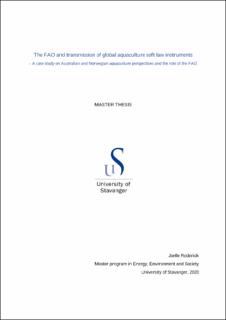| dc.contributor.advisor | Østhagen, Andreas | |
| dc.contributor.author | Roderick, Joelle | |
| dc.date.accessioned | 2020-12-11T11:49:43Z | |
| dc.date.available | 2020-12-11T11:49:43Z | |
| dc.date.issued | 2020-06 | |
| dc.identifier.uri | https://hdl.handle.net/11250/2717137 | |
| dc.description | Master's thesis in Energy, Environment and Society | en_US |
| dc.description.abstract | The FAO as an international global policy actor for aquaculture management and governance sets out to provide nations with recommendations to help manage aquaculture operations across the globe in a sustainable manner. In their pursuit to help guide domestic policymakers they have produced a number of ‘soft law’ instruments to help facilitate progress towards achieving their goals. The thesis explores two developed nations of Australia and Norway who are heavily invested in aquaculture operations. The two case studies detail each country’s approach in management and investigate if the FAO is influential in policymaking or if the information exchange is valued in either country. The thesis asks what is the extent of the FAO efforts in transmission of science and policy advice for aquaculture, and is it effective and valued by national actors?
The Science Policy Interface concept was used to help illuminate the characteristics of information flow between the FAO and the two developed countries. Whilst theory on ‘epistemic communities’ was introduced to help understand how certain actors can hold power in shaping states interests. The concept of soft law was also explored to help find out if the instruments that the FAO produce are effective. By using these different, albeit related concepts, the research study aims to unpack the movement of science and how it is implemented within states.
The research study adopted a qualitative content analysis of the Australian and Norwegian strategies and plans to help illuminate the policy output for aquaculture management of each nation to see if it aligned with the FAO’s output. The analysis discovered both countries have strong growth targets for aquaculture into the future, however both countries acknowledge the need to adopt a regulatory framework that consults science and achieves sustainable management of aquaculture. Both countries place high importance on international cooperation and the study revealed in some cases it is mutually beneficial to ascribe to an international network.
With further analysis the study was able to conclude that the flow of information within the science policy interface moves both ways which produces an interdependent relationship between the FAO and Australia and Norway. Whilst the study also revealed that epistemic communities do hold some power in shaping states interests and soft law instruments can be useful at shaping states narratives towards sustainability of ocean resources. | en_US |
| dc.language.iso | eng | en_US |
| dc.publisher | University of Stavanger, Norway | en_US |
| dc.relation.ispartofseries | Masteroppgave/UIS-SV-IMS/2020; | |
| dc.subject | Australia | en_US |
| dc.subject | Norway | en_US |
| dc.subject | FAO | en_US |
| dc.subject | miljø | en_US |
| dc.subject | global governance | en_US |
| dc.subject | aquaculture | en_US |
| dc.subject | international organisations | en_US |
| dc.subject | soft law | en_US |
| dc.subject | epistemic communities | en_US |
| dc.subject | qualitative content analysis | en_US |
| dc.subject | science policy interface | en_US |
| dc.title | The FAO and transmission of global aquaculture soft law instruments – A case study on Australian and Norwegian aquaculture perspectives and the role of the FAO | en_US |
| dc.type | Master thesis | en_US |
| dc.subject.nsi | VDP::Samfunnsvitenskap: 200 | en_US |
